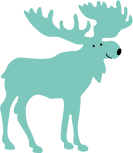Ac haca ullamcorper donec ante habi tasse donec imperdiet eturpis varius per a augue magna hac. Nec hac et vestibulum duis a tincidunt per a aptent interdum purus feugiat a id aliquet erat himenaeos nunc torquent euismod adipiscing adipiscing dui gravida justo.
Nyhet 2
Ac haca ullamcorper donec ante habi tasse donec imperdiet eturpis varius per a augue magna hac. Nec hac et vestibulum duis a tincidunt per a aptent interdum purus feugiat a id aliquet erat himenaeos nunc torquent euismod adipiscing adipiscing dui gravida justo.
Nyhet 1
Ac haca ullamcorper donec ante habi tasse donec imperdiet eturpis varius per a augue magna hac. Nec hac et vestibulum duis a tincidunt per a aptent interdum purus feugiat a id aliquet erat himenaeos nunc torquent euismod adipiscing adipiscing dui gravida justo.
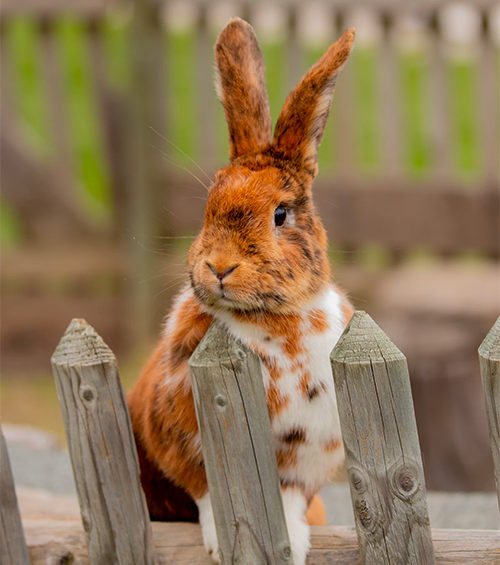
Rabbit
Rabbit
(Oryctolagus cuniculus dom) Domestic rabbits are popular pets and come in a large variety of different breeds. They are domesticated forms of the European wild rabbit. They become sexually mature at 3-4 months of age and have a nursing period of about 6 weeks.
| Belongs to: | Hares and rabbits (Lagomorpha) |
| Family: | Rabbits (Leporidae) |
| Weight: | 1-10 kg depending on the breed. |
| Lifespan: | Usually 6-8 years. |
| Gestation period: | 30-33 days. |
| Offspring: | The young are born naked and blind, with a birth weight of 30-80 grams. Dwarf breeds rarely have more than 5 offspring, while larger breeds can have over 10 young. |
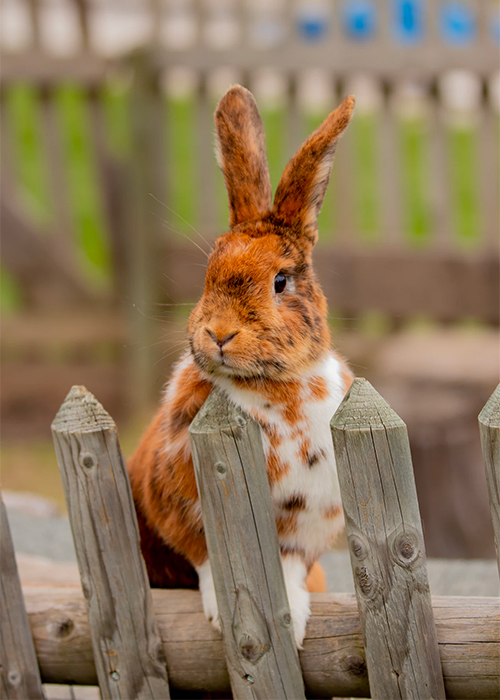

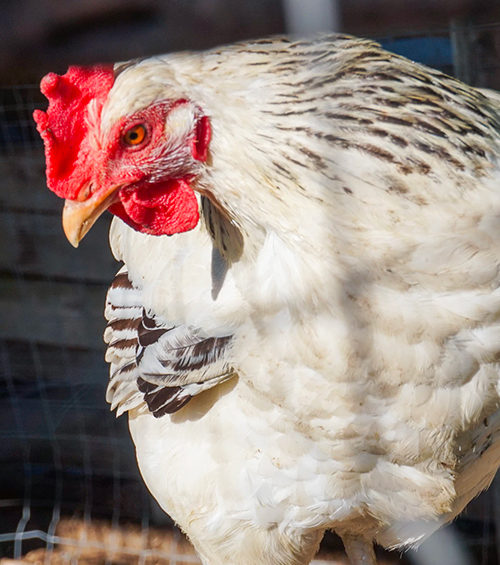
Bjurholm chickens
Bjurholm chickens
(Gallus gallus) Bjurholm chicken is Sweden's northernmost heritage breed. The breed was officially recognized in 2013.
A small remnant of the previously common small landrace chickens in Västerbotten was found by chance in the village of Bjurholm in 2011. There, the chickens had been kept on the same farm for 120 years without any other chickens being introduced into the flock. The breed was officially recognized in 2013 and is now known as Bjurholm chicken.
The down feathers of their body are relatively large, and the underdown is well developed, indicating a long adaptation to cold climates.
A small remnant of the previously common small landrace chickens in Västerbotten was found by chance in the village of Bjurholm in 2011. There, the chickens had been kept on the same farm for 120 years without any other chickens being introduced into the flock. The breed was officially recognized in 2013 and is now known as Bjurholm chicken.
The down feathers of their body are relatively large, and the underdown is well developed, indicating a long adaptation to cold climates.
| Belongs to: | Order Galliformes (gamebirds) |
| Family: | Pheasant birds (Phasianidae) |
| Weight: | Rooster 2 kg, Hen 1.5 kg. |
| Lifespan: | Normally up to 16 years, although older age records have been noted. |
| Incubation period: | around 21 days. |
| Eggs: | The Bjurholm hen's eggs weigh about 45-50 grams. |
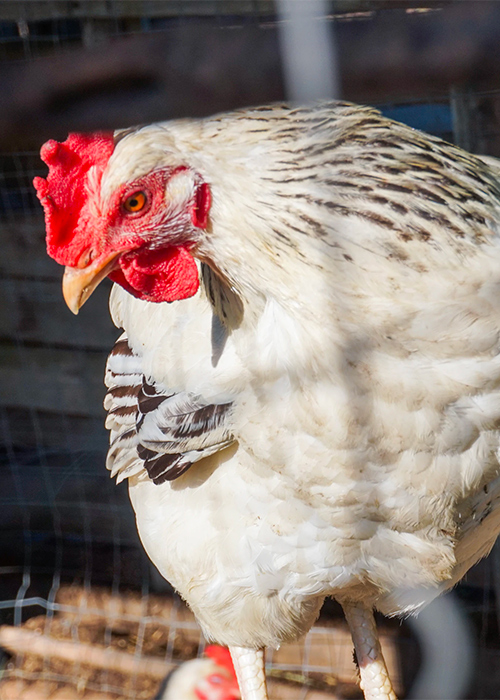
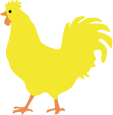
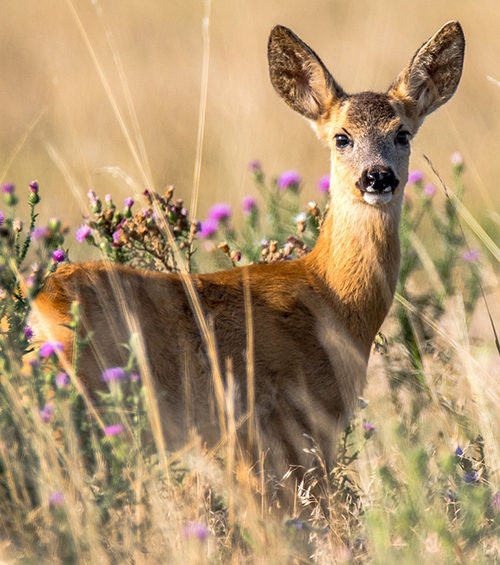
Roe Deer
Roe Deer
(Capreolus capreolus) The roe deer is our smallest deer. In the 18th century, the roe deer was on the verge of extinction in Sweden. It was saved in Skåne and since the 1850s, the population has steadily increased.
| Belongs to: | Order Artiodactyla (even-toed ungulates) |
| Family: | Deer family (Cervidae) |
| Weight: | 23-28 kg (bucks), 20-26 kg (does) |
| Lifespan: | ca 15 years |
| Mating season: | July - August |
| Gestation period: | 9-10 months, but with a delayed fetal development - the fetus begins to develop about 5 months before birth. |
| Calves: | They are called "kids". The female usually gives birth to 2 kids, which weigh 1.5-2.5 kg at birth. |
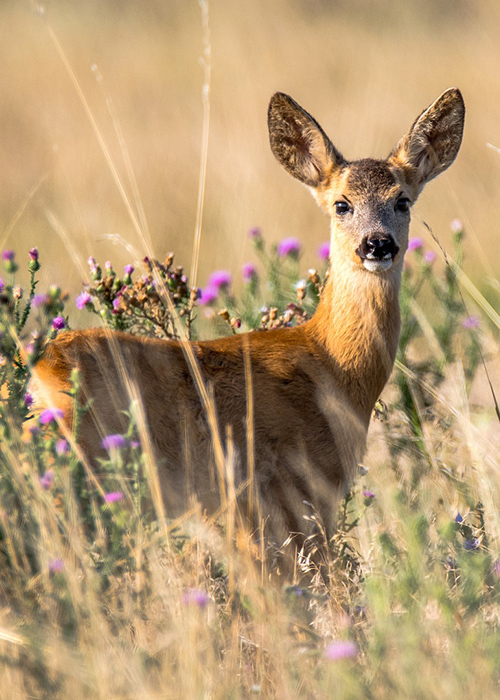

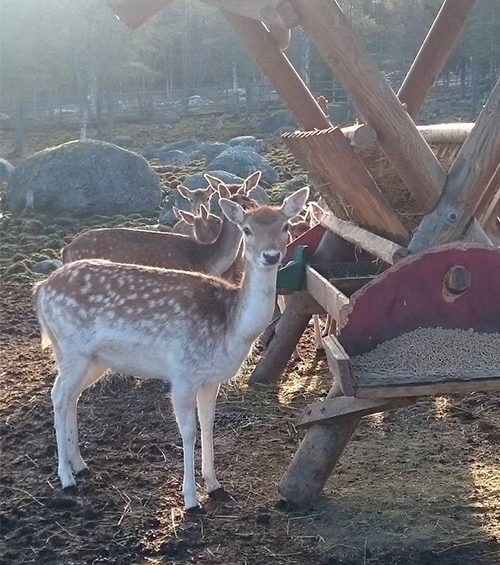
Fallow Deer
Fallow Deer
(Dama dama) The Fallow deer originally comes from the Mediterranean area and was brought to Sweden during the 16th century as a captive animal. From the mid-1800s, it has been wild (planted from captivity) in southern Sweden.
| Belongs to: | Order Artiodactyla (even-toed ungulates) |
| Family: | Deer family (Cervidae) |
| Weight: | About 100-120 kg (males), about 60-80 kg (females). |
| Lifespan: | Approximately 16 years |
| Mating season: | oktober - november |
| Gestation period: | Approximately 230 days |
| Calves: | Born in June, usually 1 calf is born sometimes 2, which nurses for 8 months. |
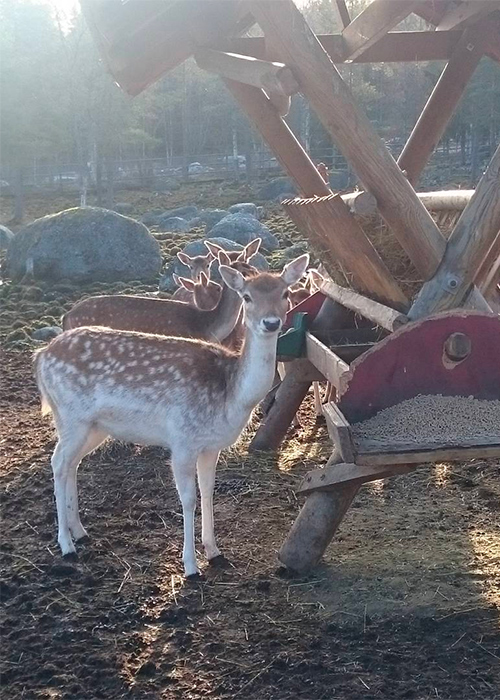
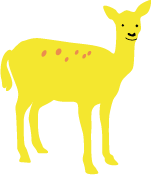
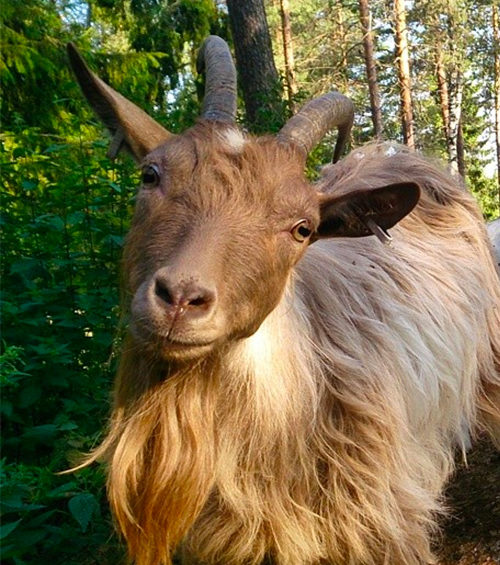
Goat
Goat
(Capra Hircus) Jämtget - The Jämtget belongs to our Swedish native goats. It can vary in color. Goats can be kept for their milk, and a good Jämtget can produce 300 - 400 kg of milk per season.
African Pygmy Goat - Originating from Africa, this breed has long been a popular species in zoos due to its size and friendly temperament. It has short legs, a compact body, and a small head. Shoulder height is about 40 cm.
Lappget - The Lappget is our northernmost breed of native goats. It originates from and is adapted to reindeer grazing land.
African Pygmy Goat - Originating from Africa, this breed has long been a popular species in zoos due to its size and friendly temperament. It has short legs, a compact body, and a small head. Shoulder height is about 40 cm.
Lappget - The Lappget is our northernmost breed of native goats. It originates from and is adapted to reindeer grazing land.
| Belongs to: | Order Artiodactyla (even-toed ungulates) |
| Family: | Bovid family: (Bovidae). Subfamily: (Caprinae). |
| Weight: | Jämtget around 40 kg, African Pygmy Goat 20-30 kg, Lappget around 30-80 kg Lappget ca 30-80 kg |
| Lifespan: | Up to 25 years |
| Gestation period: | Around 5 months |
| Offspring: | 1-2 kids (most commonly two) |
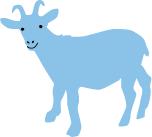
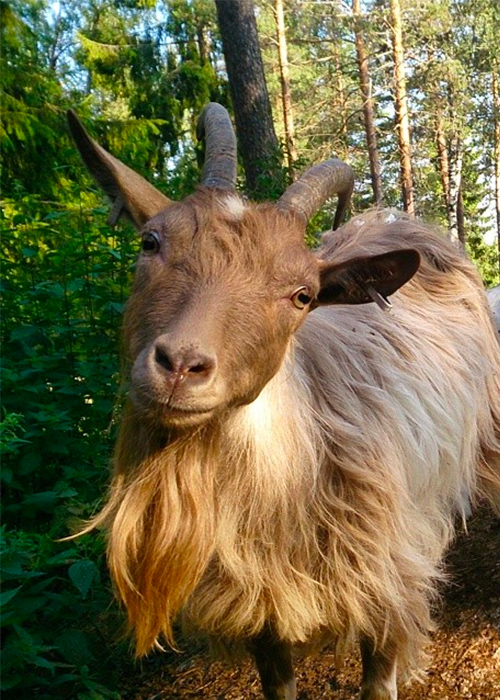
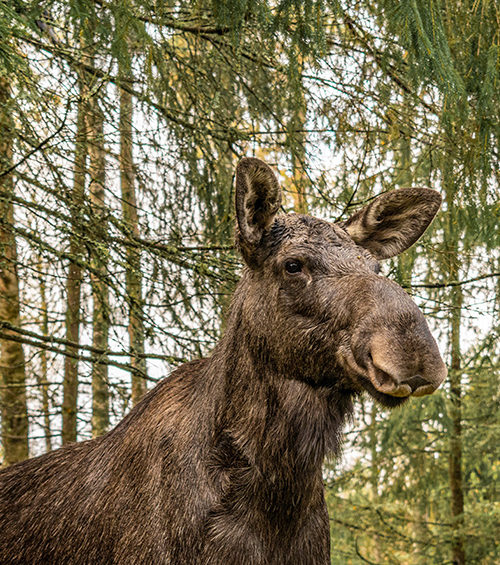
Moose / Elk
Moose / Elk
(europeisk älg; Alces alces) The moose is the largest land mammal in our country. It is found throughout the country except on the island of Gotland. In the past 20-30 years, the moose population has increased significantly, and today we have a population of about 300,000 animals. The reasons for the increase are several, but regulation of hunting and more abundant food due to new forestry methods (clear-cutting) are the main ones. The male moose has the largest antlers at the age of 7-10 years and is then called a "kapital". Then the antlers decrease in size and are called "retur". There are two types of antlers: palmate antlers and cervine antlers.
| Belongs to: | Order Artiodactyla (even-toed ungulates) |
| Family: | Deer family (Cervidae) |
| Weight: | Between 320-450 kg (bulls), in extreme cases up to 800 kg. Between 275-375 kg (cows). |
| Lifespan: | Up to 25 years |
| Mating season: | 1 September-October |
| Gestation period: | ca 8 months |
| Calves: | Born in May-June and weighs 8-15 kg at birth: usually 1 or 2 calves, which nurse for 7-8 months. |
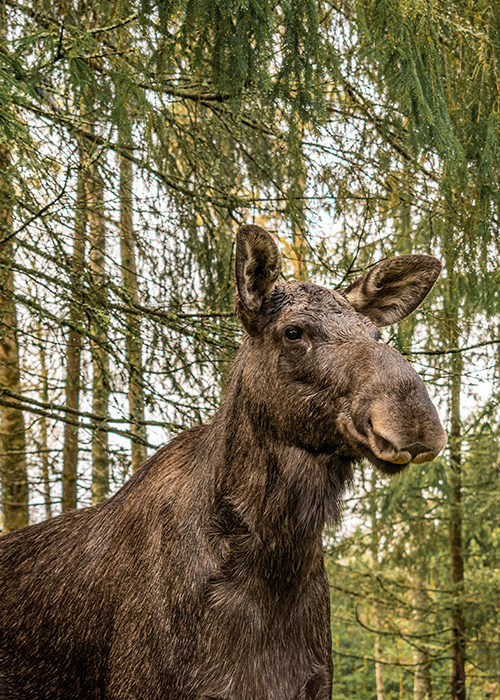
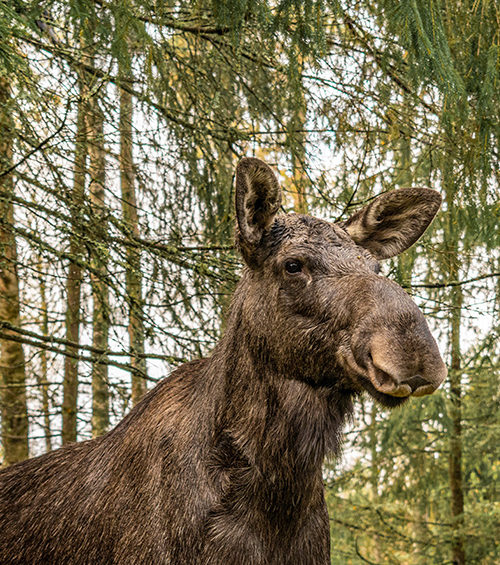
Moose / Elk
Moose / Elk
(europeisk älg; Alces alces) The moose is the largest land mammal in our country. It is found throughout the country except on the island of Gotland. In the past 20-30 years, the moose population has increased significantly, and today we have a population of about 300,000 animals. The reasons for the increase are several, but regulation of hunting and more abundant food due to new forestry methods (clear-cutting) are the main ones. The male moose has the largest antlers at the age of 7-10 years and is then called a "kapital". Then the antlers decrease in size and are called "retur". There are two types of antlers: palmate antlers and cervine antlers.
| Belongs to: | Order Artiodactyla (even-toed ungulates) |
| Family: | Deer family (Cervidae) |
| Weight: | Between 320-450 kg (bulls), in extreme cases up to 800 kg. Between 275-375 kg (cows). |
| Lifespan: | Up to 25 years |
| Mating season: | 1 September-October |
| Gestation period: | ca 8 months |
| Calves: | Born in May-June and weighs 8-15 kg at birth: usually 1 or 2 calves, which nurse for 7-8 months. |

